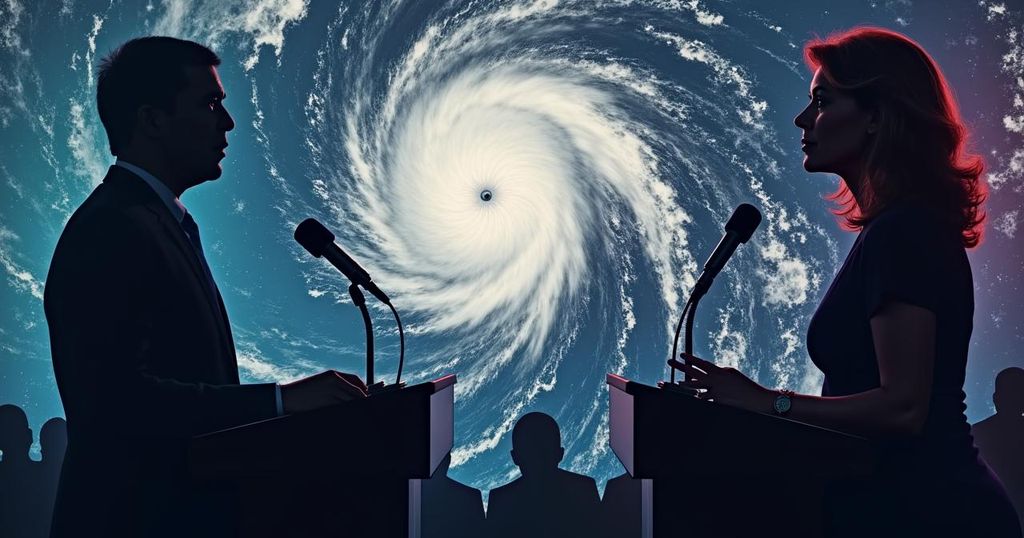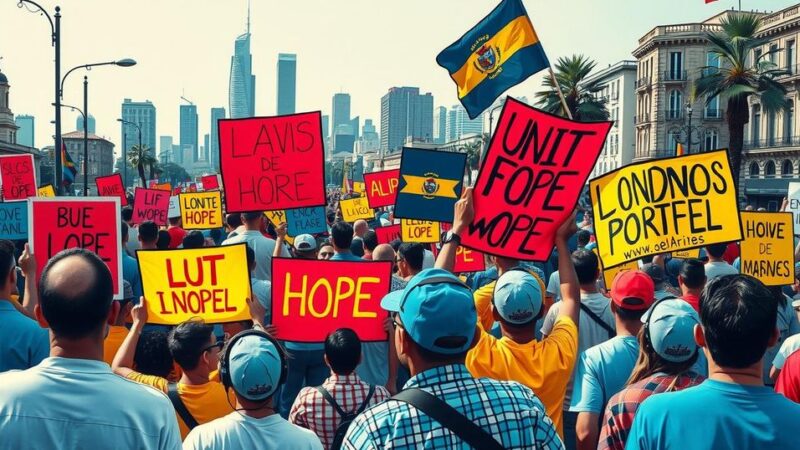Hurricane Helene caused widespread devastation across several states, prompting discussion on climate change during the vice presidential debate. Senator J.D. Vance expressed skepticism over human-induced climate change while supporting domestic manufacturing and natural gas production, whereas Governor Tim Walz praised the Inflation Reduction Act as a significant climate initiative. Their contrasting views illustrate the ongoing debate over environmental policy in the United States.
This week, Hurricane Helene intensified and struck various states including Florida, Georgia, South Carolina, North Carolina, Tennessee, and Virginia, leading to significant devastation. The hurricane has tragically claimed over 160 lives, rendered thousands displaced, and resulted in extensive, yet unquantified, damage to homes and infrastructure. Search and rescue operations are actively ongoing for the more than 600 individuals who remain missing. The urgency of the situation prompted discussions on climate change during the recent vice presidential debate, which was moderated by Norah O’Donnell and Margaret Brennan. O’Donnell highlighted the consensus among scientists regarding the alarming rate of global warming and its contribution to more potent and frequent hurricanes. An analysis conducted by scientists at the Lawrence Berkeley National Laboratory insinuated that climate change could be responsible for an increase in rainfall in segments of the U.S. Southeast by as much as 50%. Although this analysis is yet to undergo peer review, it employs methodologies from previous peer-reviewed studies. Senator J.D. Vance (R) was questioned about the Trump administration’s plan to address climate change, acknowledging public concerns regarding unusual weather patterns. However, he expressed skepticism regarding the role of human-induced carbon emissions in climate change, proposing that strategies to reduce emissions should focus on reshoring domestic manufacturing and enhancing natural gas production. It is worth noting that numerous scientific studies correlate climate change with rising atmospheric carbon dioxide levels. Vance emphasized that he and Donald Trump aspire for a cleaner and safer environment. In contrast, Governor Tim Walz (D) of Minnesota, who is the running mate of Vice President Kamala Harris, commended the Biden-Harris administration for the Inflation Reduction Act (IRA), which he described as the most significant investment in climate initiatives in global history. Walz underscored that the IRA allocates billions towards combating climate change and promoting domestic green energy production. He posited that it is feasible for the United States to advance in both oil and gas production while simultaneously fostering clean energy development, refuting the notion that job creation necessitates sacrificing environmental goals. Walz asserted that U.S. oil and gas production is at an all-time high, clarifying that Harris does not advocate for a halt on domestic fossil fuel production. The governor criticized Donald Trump’s earlier dismissal of the climate crisis and his willingness to favor policies aiding the oil and gas sector in exchange for political contributions. Furthermore, Walz stated, “My farmers know that climate change is real.” An inquiry directed towards Vance regarding Trump’s perspective on climate change was met with evasiveness, as he pivoted to critique the environmental impact of producing solar panel components in China. Walz countered this by advocating for an inclusive energy policy that would facilitate job creation domestically. The debate has highlighted the fundamentally differing views on climate responsibility and the implications of Hurricane Helene in shaping critical environmental discussions.
The article addresses the impact of Hurricane Helene and its influence on the recent vice presidential debate concerning climate change. This discussion serves as a lens through which the candidates’ approaches to environmental issues and policy responses are examined in the wake of a significant natural disaster. Notably, the implications of climate change on storm frequency and severity are underscored, showcasing differing political perspectives on addressing these challenges.
In conclusion, the tragic events brought about by Hurricane Helene have rekindled critical dialogue surrounding climate change during the vice presidential debate. The contrasting viewpoints of Senator J.D. Vance and Governor Tim Walz reflect the broader national discourse on environmental responsibility and the pathways to mitigate climate change while ensuring economic growth. The responses provided by each candidate highlight ongoing divisions in policy thinking that could significantly impact future legislative actions against the backdrop of an ever-evolving climate crisis.
Original Source: eos.org






